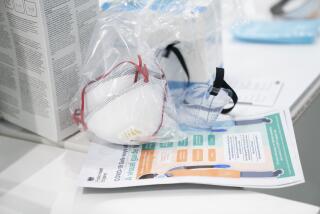Recycled pills can generate power
- Share via
milwaukee -- Don’t be so quick to throw out that expired blood pressure medication. Drug disposal companies are taking outdated or recalled prescription drugs from pharmacies and manufacturers and incinerating them, generating energy.
Milwaukee-based Capital Returns Inc. last year created enough energy to power more than 220 homes for a year. To do that, it incinerated 6.5 million pounds of pills and other pharmaceuticals, which are sent from pharmacies and drug manufacturers around the country.
The company predicts individuals and not just corporate clients soon will be able to have their unwanted drugs incinerated, creating an even larger source of energy. Such a move -- which the federal government must approve -- would give people an alternative to flushing the often-toxic substances down their toilets, which can pollute the environment.
The Environmental Protection Agency encourages local drug-collection programs to limit the amount of medication that makes it into the water supply, said Ben Grumbles, the regulator’s assistant administrator for water. Studies have shown adverse effects on fish, such as to their reproductive organs, though harm to humans has not been shown, he said.
Incineration, when done properly, has minimal effect on the environment. But federal approval could take years. In the meantime, pilot disposal programs are popping up around the country.
The push for these programs will grow as the population ages and people rely on more pharmaceuticals, said Len Kaye, director of the University of Maine Center on Aging, which just received an EPA grant to start a pilot program in which people return drugs by mail.
The possibility to create more energy will grow as well then.
“That would make it a win-win situation for everybody involved and certainly add to the payoff,” said Kaye, who also spearheads a conference of academics and others on ways to expand drug disposal. “We want simply at this point to destroy them properly. That’s an accomplishment in and of itself.”
The pharmaceutical disposal industry -- now only used by manufacturers and pharmacies -- started in the early 1990s. Before then, pharmacies had to do returns themselves or wait for pharmaceutical companies to pick up unwanted drugs and handle destruction.
Since the beginning, Capital Returns decided to use incineration plants that convert drugs to energy to limit environmental impact, said President Larry Hruska.
Last year it created nearly 2 million kilowatt hours of electricity, enough to light about 220 homes for a year. The electrical industry figures the average home uses 9,000 kilowatt hours a year.
“Instead of just having this product go someplace and be destroyed, and have no benefit whatsoever because it’s dumped in the ground, it’s great it’s able to create some energy and a resource that people are able to use,” Hruska said.
Capital Returns has 28% of the market and expects a 20% increase in revenue this year, Hruska said. He would not give dollar figures for the company, a unit of privately owned Genco, based in Pittsburgh. There are about 40 medical returns companies, called “reverse distributors,” registered with the Drug Enforcement Administration, according to its website.
Even though Capital Returns figures only about 1% of all drugs are returned, either because of recall or expiration, there’s plenty to be had. The company estimates the value of pharmaceuticals returned to third-party disposal companies each year is $4 billion to $5 billion, though that’s not what disposal companies are paid. It declined to release such numbers.
Day after day, semis loaded with pharmaceuticals come to the company’s headquarters, where Capital Returns’ 600 workers unload them and scan them into a computer system. Companies can track their shipments online, which is especially important in the case of a recall, when the government must be assured of destruction.
The drugs travel to an incineration plant in Indianapolis run by Covanta Energy Corp., which sells the steam energy to a local utility. Hazardous materials are taken to an incinerator in Arkansas.
More to Read
Inside the business of entertainment
The Wide Shot brings you news, analysis and insights on everything from streaming wars to production — and what it all means for the future.
You may occasionally receive promotional content from the Los Angeles Times.










